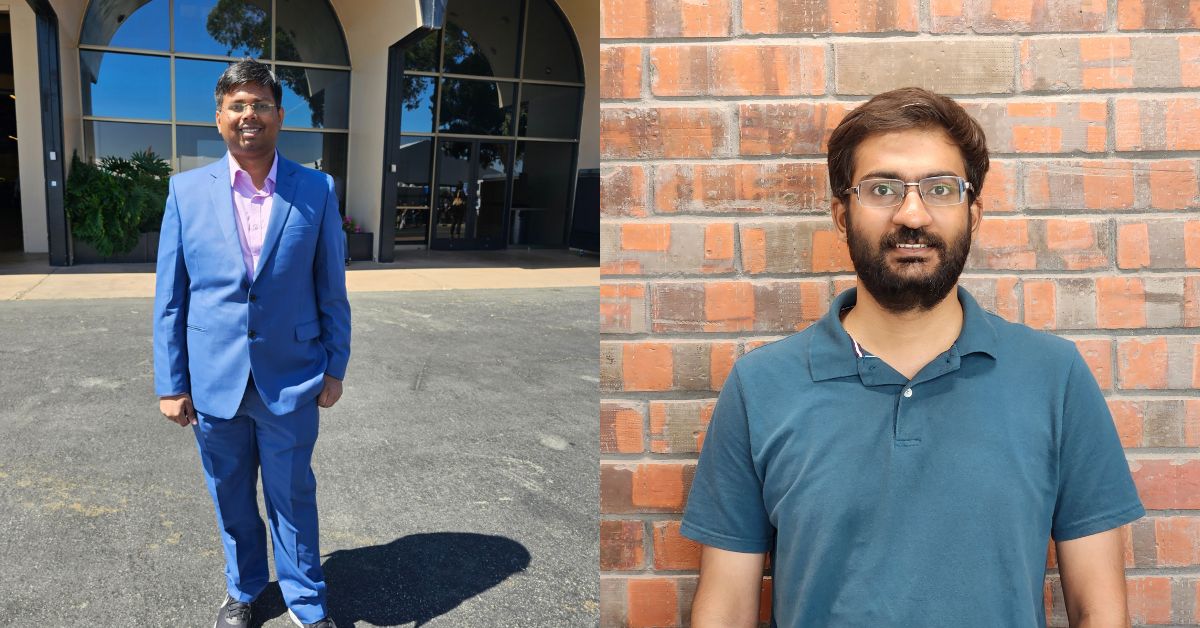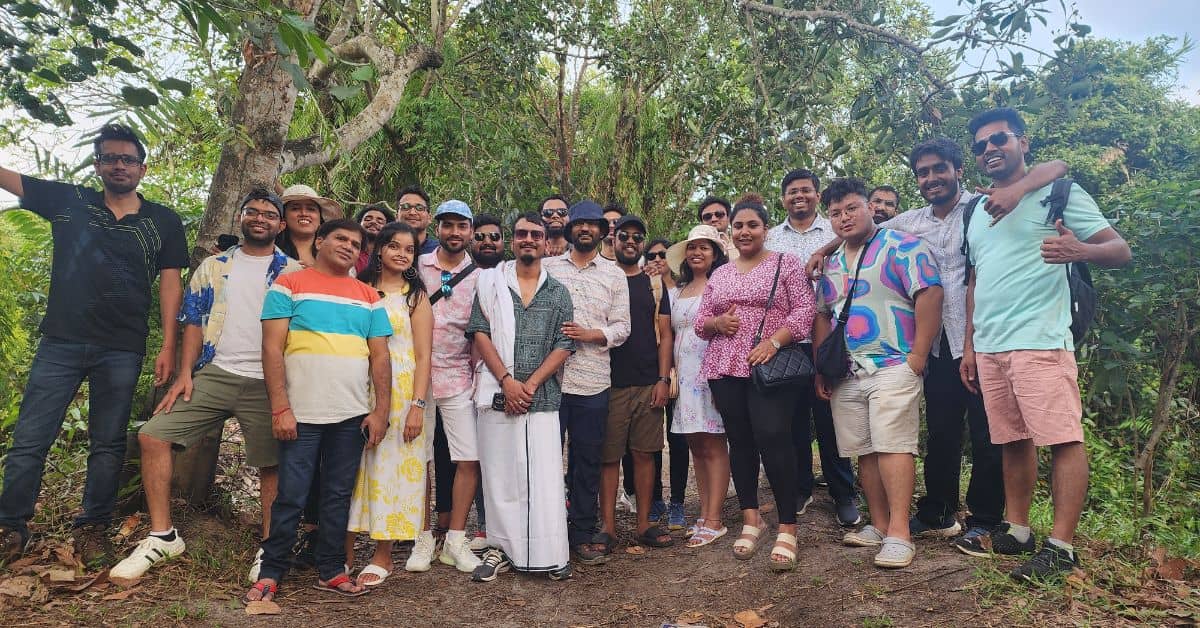This vendible is sponsored by VdoCipher
Between 2010 and 2015, Siddhant Jain and Vibhav Sinha attended IIT Delhi. During this period, surpassing the rise of OTT (over-the-top media service), many students resorted to watching pirated movies and downloading pirated books and courses. Their sensation well-nigh the impact of piracy grew when they saw a tropical friend unauthentic by it.
“My roommate Satish used to teach chemistry to Matriculation 11 and 12 students in Mathura and Delhi every weekend for a year. When online coaching became popular, he thought of transitioning his classes online. However, he was concerned well-nigh sharing his thoughtfully crafted notes online, fearing that his content might be leaked and distributed,” says Siddhant to The Better India.
Satish’s quandary led the two friends to realise the gravity of the situation.
“We noticed that online video piracy was adversely well-expressed teachers like Satish when they tried to upload good content online. Many individuals would download these matriculation videos and distribute them on platforms like Telegram, YouTube or WhatsApp, reaching a large audience. This situation resulted in genuine teachers losing the opportunity to enrol new students and losing income as a consequence,” adds Siddhant.
Video piracy doesn’t just harm movie and show producers; it moreover impacts teachers and creators of educational content. Ultimately if teachers do not put their weightier content out on the internet, it is a loss to the student polity as well. According to a 2022 report by Ankura Piracy Statistics, India ranks as the third-largest freelancer to visits to content piracy websites, pursuit the US and Russia, with over seven billion visits.
In 2014, while they were still students, these two engineers embarked on a mission to solve this issue using their video encryption technology.
Providing security versus online piracy

With a keen interest in encryption and software, Vibhav decided to combine encryption with cloud-based video players. Siddhant joined him to test the product and help with the sales. They first piloted their prototype with a finance-based e-learning platform, and without some tweaks, launched VdoCipher in September 2014.
VdoCipher provides highly secure DRM (Digital Rights Management) encryption — a security that protects videos from unauthorised wangle — and user-based watermarking. This is combined with a smart customisable video player to ensure that videos are not illegally downloaded, and that viewers have a unconfined playback experience.
“We provide security through DRM encryption and watermarking. Basically, any customer, be it a teacher or an ed-tech platform, is provided with a video dashboard. They upload the content to that dashboard where it is encrypted, ensuring wangle only to authorised users,” says Siddhant, CEO, VdoCipher.
He continues, “On mobile phones, we can prevent screen capture also. Since this can’t be prevented on computers in all cases, we provide user-based watermarking to discourage sharing. If they segregate to share the screenshot, their name/user ID will towards on the image; it moreover helps us trace them.”
The engineer duo requirement to offer ‘Hollywood grade security’ as they use the same technology used by Netflix and other large streaming services. Their USP is moreover their worthiness to provide this anti-piracy technology to everyone — from a small teacher taking an online matriculation to large ed-tech companies.
“We use Google DRM encryption and Apple DRM encryption, which provide very upper security. They are the tools used by Netflix, Hollywood and Bollywood movies. We were the first visitor in India to provide such a upper level of security technology in an easy-to-use way, notes Siddhant.
“This tech was not misogynist to e-learning platforms as it was difficult to integrate. We have made it easy and accessible,” he shares.
A government exam preparation undertow platform (UPSC and others) with over 10,000 online students and 17 centres wideness the country adds that their videos were getting leaked as the streaming platform was not secure. In 2019, they started using VdoCipher’s service and saw a marked difference, with increasingly teachers trusting them. “Partnering with VdoCipher stopped video sharing and helped us in trademark towers too. Teachers moreover ripened conviction in our brand,” says a spokesperson of the platform.
Besides security, VdoCipher moreover provides smooth streaming for slow internet connections, which helps premium content reach students in Tier II and III cities. VdoCipher moreover enables offline playback on mobiles and a tuft of interactive player features to ensure the weightier student experience.
“Our goal is to ensure that students from any remote areas in our country should get wangle to premium video content. Poor network connectivity should not be a hindrance in accessing quality education,” he adds.
VdoCipher uses a usage-based pricing model where customers pay based on how much data their students or viewers use. The duo claims to have over 3,000 paying customers wideness 100 countries, streaming over seven million hours of content on a monthly basis. They say that as COVID led to a tattoo in the ed-tech space, the need for content security is moreover booming.
“We have moreover seen a substantial increase in student footfall. This security has helped us do justice to serious students, teachers and other merchantry stakeholders who were putting efforts in terms of time and money,” adds the customer.
Helping teachers protect their content

Over the past seven years, the journey for these 30-year-old entrepreneurs has been filled with challenges. The field of security technology constantly evolves, requiring regular software updates.
“We have had three updates just in the last five years, which required us to transpiration our software each time. Earlier, we were providing our software through a wink player. When this full-length was removed from browsers, we had to completely shift our technology, which took a lot of time and effort,” informs Siddhant.
They faced hiccups in securing their initial funding as this space was relatively new in India. “But now”, they say, “there is no looking back!” Currently, the engineers are profitable educators not just in India but moreover in other regions like Africa.
A physics teacher from Tunisia, Africa, who launched Tunisia’s first online undertow platform, is among their customers. Siddhant explains that when the teacher started using VdoCipher eight years ago, he had 200 students. Today, he has over four lakh students and over 450 teachers.
Their friend Satish, who inspired VdoCipher, is now a consumer himself teaching chemistry through his coaching classes to students in Haryana.
Edited by Pranita Bhat

